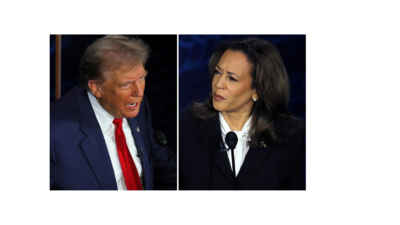- News
- World News
- US News
- US elections: Polls reveal where Donald Trump and Kamala Harris stand
Trending
US elections: Polls reveal where Donald Trump and Kamala Harris stand
The American presidential race between Kamala Harris and Donald Trump remains close after the first debate, especially in swing states like Philadelphia and Pennsylvania. Polls show Harris slightly ahead but within the margin of error. Voters are divided, with about half seeing Harris as a better potential president than Trump.

Harris-trump presidential debate hosted by ABC in Philadelphia, pennyslvalnia
The American presidential race between Kamala Harris and Donald Trump remains very close after the first presidential debate, particularly in the crucial swing states of Philadelphia and Pennsylvania, recent polls show.
According to Patrick Murray, director of the Monmouth University Polling Institute, the debate had minimal impact on the polls, stating, "We are at a point where it's 10,000 voters here or there, it's a point where polling just can't measure.
The Marist poll of Pennsylvania voters conducted after the debate reveals Harris and Trump tied at 49%, both within the margin of error. Similarly, the Philadelphia Inquirer, New York Times, and Siena College post-debate poll shows Harris with 50% and Trump with 46%. This poll also highlights the gender gap in the race, with Harris garnering stronger support among older Black voters compared to younger ones. Notably, 21% of Black men under 50 planned to vote for Trump, while 72% intended to support Harris.
A recent poll from The Associated Press-NORC Center for Public Affairs Research suggests that Harris is viewed slightly more favourably than she was in July, shortly after President Joe Biden withdrew from the race.
Approximately half of the voters have a somewhat or very positive view of Harris, while 44% hold a somewhat or very negative view. In contrast, six in 10 voters have a somewhat or very unfavourable view of Trump, and about 4 in 10 have a somewhat or very favorable view of him.
The survey also revealed that only around one-third of voters believe the phrase "would change the country for the better" describes either Trump or Harris extremely or very well, indicating a lingering sense of pessimism among voters regarding their options in the race. Sean Luebbers, a high school history teacher in Upland, California, who supports Harris, expressed doubts about the election's ability to resolve the country's polarization, stating, "Right now, you might call it triage. We can't make things worse."
Despite the challenges, the poll suggests some positive signs for Harris.
Voters are more likely to believe that Harris would make a good president compared to Trump, with about half of the voters expressing this sentiment for Harris and only 36% for Trump. Additionally, voters perceive Harris as having a better chance of winning the election in November, although a significant portion of voters believe the candidates are equally likely to win or have no opinion on the matter.
According to Patrick Murray, director of the Monmouth University Polling Institute, the debate had minimal impact on the polls, stating, "We are at a point where it's 10,000 voters here or there, it's a point where polling just can't measure.
Polling measures in feet and yards, and this is a game of inches right now."
The Marist poll of Pennsylvania voters conducted after the debate reveals Harris and Trump tied at 49%, both within the margin of error. Similarly, the Philadelphia Inquirer, New York Times, and Siena College post-debate poll shows Harris with 50% and Trump with 46%. This poll also highlights the gender gap in the race, with Harris garnering stronger support among older Black voters compared to younger ones. Notably, 21% of Black men under 50 planned to vote for Trump, while 72% intended to support Harris.
A recent poll from The Associated Press-NORC Center for Public Affairs Research suggests that Harris is viewed slightly more favourably than she was in July, shortly after President Joe Biden withdrew from the race.
The poll, conducted before the apparent assassination attempt on Trump's golf course in Florida, found that Trump's favorability ratings remained stable.
Approximately half of the voters have a somewhat or very positive view of Harris, while 44% hold a somewhat or very negative view. In contrast, six in 10 voters have a somewhat or very unfavourable view of Trump, and about 4 in 10 have a somewhat or very favorable view of him.
The survey also revealed that only around one-third of voters believe the phrase "would change the country for the better" describes either Trump or Harris extremely or very well, indicating a lingering sense of pessimism among voters regarding their options in the race. Sean Luebbers, a high school history teacher in Upland, California, who supports Harris, expressed doubts about the election's ability to resolve the country's polarization, stating, "Right now, you might call it triage. We can't make things worse."
Despite the challenges, the poll suggests some positive signs for Harris.
Voters are more likely to believe that Harris would make a good president compared to Trump, with about half of the voters expressing this sentiment for Harris and only 36% for Trump. Additionally, voters perceive Harris as having a better chance of winning the election in November, although a significant portion of voters believe the candidates are equally likely to win or have no opinion on the matter.
End of Article
FOLLOW US ON SOCIAL MEDIA











